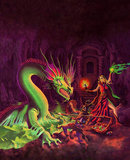|
quantumfoam posted:Thanks for posting the corrections on Rosinate book 1 versus what I remembered from reading the Rosinate series years ago. Yeah, sure. -"There is no God but God and Shashkash is its Prophet". The manipulative AI builds a religion in order to win at everything, and as deus ex machina goes it was set up at the start of the three books and then triggers very nicely at the end. - Real plausible physics, nothing outside the realm of what's possible, no aliens, and still a massive page turner - Same kind of Engineering Fic as Verne's "The Mysterious Island" and "A Succession of Bad Days" (By Graydon Saunders!) - Strong message in favor of human germline modification - It's partially a comedy, and yet it's never played for laughs- like the Lieutenant Leary books, it is a comedy where the amusing elements are stupid humans being bad at things, but not more bad than real humans are
|
|
|
|

|
| # ? Apr 25, 2024 18:56 |
|
Quote is not edit
|
|
|
|
That stuff you found good I found ehhhh to grating in the RfR series, except for the AI stuff which I actively hated. The deus ex machina resolve was extremely When Harlie Was One, which can be taken as either a compliment or a diss. I can't ever take Jules Verne's The Mysterious Island seriously, it's essentially 19th century competency porn laden with secret gifts from a stalker. Competency porn fiction seems as addicting for authors like Andy Weir and Tom Holt in his KJ Parker persona as re-writing Xenophon's Long March is for mil-fiction/mil-scifi authors. Oh man, I just imagined Andy Weir writing his own bespoke version of Xenophon's Long March and it was terrible.
|
|
|
|
is this the thread for talking about the 1632 series? I'm doing a reread of the series atm.
|
|
|
|
Talk away
|
|
|
|
I really enjoy how John Simpson evolves from strawman to person over the series. He starts as a "CEO bad" cliché and ends up a complex character.
|
|
|
|
Mycroft Holmes posted:is this the thread for talking about the 1632 series? I'm doing a reread of the series atm. You're a braver person than me. Are you including all the supplement material Eric Flint wrote for that thread?
|
|
|
|
Mycroft Holmes posted:I really enjoy how John Simpson evolves from strawman to person over the series. He starts as a "CEO bad" cliché and ends up a complex character. I agree; it's funny how he and Underwood essentially switch places. I also appreciate how Flint writes Gustav Adolf, the way his devout Christianity gives him a lens through which to understand and gradually accept many of the democratic ideas and practices the uptimers insist on.
|
|
|
|
Fivemarks posted:SM Stirling is a piece of poo poo, not just for the Draka For me it's how he said he would commit magic-button genocide against Muslims if he had the opportunity. Which is horrific enough, but this came up on Usenet in 2000, so he doesn't even get the "9/11 hosed him up" excuse like Dan Simmons.
|
|
|
|
GTD Aquitaine posted:For me it's how he said he would commit magic-button genocide against Muslims if he had the opportunity. Which is horrific enough, but this came up on Usenet in 2000, so he doesn't even get the "9/11 hosed him up" excuse like Dan Simmons. SM Stirling is a utter shitbag, nor arguments there. Jerry Pournelle will always be worse than SM Stirling, and a close second in terribleness to Robert Heinlien though. At least John Barnes can use the excuse of his mind getting his mind snapped by the Yugoslavia Bosnian-Serbian war a good seven or eight years before SM Stirling made that usenet post for his work getting super-hosed up and extremely content-warning.
|
|
|
|
every mil sf author over 30 wondered why the get some guy in full metal jacket wasn't the hero of the story
|
|
|
|
https://twitter.com/scalzi/status/1548745173076672512 Very sad if true.
|
|
|
|
RIP
|
|
|
|
He was responsible for (good or ill) the Baen Free Library, one of the big proponents of ebooks, as well as being a moderating influence on a lot of the Baen authors that he worked with.
|
|
|
|
Sad if the Eric Flint death notice is true. Eric Flint was a solid mil-scifi editor-author, and never seemed to abuse his power; which was a refreshing change from howPournelle/Asimov/Aldiss/Knight/Campbell, etc operated.
|
|
|
|
https://twitter.com/BaenBooks/status/1548746657373749249
|
|
|
|
If the latest round of China/Taiwan-baiting has you nostalgic for mil-fiction about China, you can't go wrong reading Dean Ing's Systemic Shock. Hurt feelings, stolen oil tankers, bioweapons, matter transmutation, topknots, 8th dimensional chess strategies, Canada being the worlds number #1 producer of chocolate, etc. Alternatively, Fred Saberhagen's mil-scifi Beserker series aged ok.
|
|
|
|
Ing is an odd writer, stay away from 'Pulling Through', but I liked 'Spooker' and 'Butcher Bird'.
|
|
|
|
Dreaming up future Mil-spec technology/possible near future technology is what Dean Ing writes best. Anything else Ing writes gets weird fast. Spooker, wait a sec. It has a pair of freelance murder-grifters that target and kill undercover intelligence agents right? Only the murder-grifters are deeply and I mean deeply hosed up.
|
|
|
|
quantumfoam posted:Dreaming up future Mil-spec technology/possible near future technology is what Dean Ing writes best. Anything else Ing writes gets weird fast. That's the one. Kill intelligence agents and steal their stuff.
|
|
|
|
The central idea around Spooker is good ( Kill intelligence agents and steal their stuff), but the implementation is terrible and I'd never recommend Spooker to anyone. Or feel suspect about anyone who liked Spooker. The hero in Spooker is a Angus MacGyver (1980s version) knockoff, and the two villains are a sociopath that tortures small animals to death and then fucks their corpses plus their mother, who is a narcissistic ex-spy secret hermaphrodite that raised them wrong The reason why I've read Dean Ing, and still occasionally re-read Dean Ing is because he was adept at inventing near-possible future tech. Qualifier: Writing future tech that requires at least 2 exponential jumps in existing circa 2022 technology to exist, let alone whenever the stories were first written. For the Quantrill series set in the far-off 1990's, the near-possible future tech was multiple forms of ground-effect hover vehicles, drone aircraft that could loiter in the area for months verging on years, a off-road Segway that could go 50mph/had a 50 mile range at max speed, next-next generation stealth submarines, fighter-bomber delta wing dirigibles, a pistol that used caseless ammo and had no recoil and it was silent too because it used "cold gas" to absorb the heat of the caseless ammo burning/nullify muzzle flash, delta-wing dirigibles that were essentially flying off-road semitrucks hauling multiple trailers, etc.
|
|
|
|
The two S.T.A.L.K.E.R. novels aged pretty well given current world events. The main character in them is a Ukrainian military officer. The STALKER in-game factions are included, mild gunporn, GPS phalbets, STALKER exo-suits, and middle of the book black-out drunken party transcripts that crop up in almost every eastern european bloc fantasy fiction/mil-fiction story I've come across. The first S.T.A.L.K.E.R. novel, S.T.A.L.K.E.R. Southern Comfort, is a mix of Apocalypse Now (the 1979 movie) + Prince of Darkness (the 1987 movie) that takes place mostly in a new Exclusion Zone located in central Afghanistan. The second S.T.A.L.K.E.R. novel, S.T.A.L.K.E.R. Northern Passage, takes place in both the original Zone and the new Afghanistan Exclusion Zone, with mild reveals of what caused the new Zone, and a dark mirror antagonist to the main character.
|
|
|
|
Read some really interesting World War 2 non-fiction books over the past two weeks. First one was the biography of the UK version of Steve McQueens character from the 1963 movie The Great Escape that was a POW from 1940 until his liberation in 1945 called THE LAST ESCAPER. It didn't pull many punches, and had some interesting escape stories. The other noteworthy book was A BATTLE OF WRENS AND WOLVES which was about the now-forgotten group of unsuitable for sea-service Royal Navy officers and Wrens that taught anti-submarine tactics during World War 2 via Fletcher Pratt style miniature wargaming.
|
|
|
|
I just finished an H. Beam Piper reread, and I'd like to check in on one of my favorite problematic authors. I'll start with the "product of his times" spiel and then get into some unsavory details, he starts his career worse than expected for his times. His very first novel, Murder in the Gunroom, features as a main character a private detective names Jefferson Davis Rand. The South African Rands. Even for 1950 that's not a good look. He mellows on that over the course of his career, ending up at the end of it with Little Fuzy, which features a newly discovered indigenous species being treated with respect and not a drop of colonialism. Further, I'll say that he shows no signs whatsoever of actual racism, at least to humans. Several characters are introduced as being black and then their skin tone is completely ignored. I think he has a rugged individualism fetish as at least part of this. It's actually a good mystery for all it's bad politics, and it's loaded with gun porn. Colonialism. Piper is mostly unabashedly pro-White Man's Burden style thinking. Uller Uprising is a retelling of the Sepoy Mutiny with contragravity and nuclear weapons. By the end of his career, in Little Fuzzy the main characters defend the Fuzzies from the corporation that owns their world. There's a real evolution in his world view and it shows in his work. Misogyny. He isn't. Piper is actually ahead of his time here, many of his stories and novels feature strong women characters who do important, plot-relevant things. In the shorts Ominilingual and Naudsonce, women do the heavy scientific lifting to resolve the core challenge of the story. Even in Uller Uprising there's a strong woman helping run the military response to the uprising. He does drop in a few phrases about "oh, women are emotional, they'll always react that way", but stuff like that shows up alongside a female main character who is driving the plot. It's window dressing. The setting. Piper wrote about 6000 years of future history, starting with the 3rd and 4th World Wars devastating the Northern Hemisphere, leaving the other half of the planet to rebuild and leap to the stars. It ends, thousands of years hence, with cycles of civilizations and decay starting with a Terran Federation and ending in several galactic empires. One of his core concepts is that history rhymes, the same sort of things keep happening. This philosophy is referred to frequently in his works, and one of his novels is, as I said, a historical event with SF trappings. Project Gutenberg. Right here, https://www.gutenberg.org/ebooks/author/8301 I did pay a buck for a consolidated collection on the Kindle store for convenience, but there's just about everything he wrote. https://smile.amazon.com/gp/product/B07D3T11JR/ Other books. Piper wrote about reincarnation and alternate timelines in a good portion of his work. Lord Kalvan of Otherwhen is a story of a cop who ends up accidentally being dumped on another timeline. He has to learn the languages and get in good with the locals, then help them defend themselves against a more powerful nation, he can help because the locals barely have gunpowder, and Kalvan has some chemistry courses under his belt. THis kind of bootstrapping development shows up again in Piper's work.
|
|
|
|
Uller Uprising. This is an almost painfully straightforward tale. The Chartered Uller Company is trading with, and trying in ways the British would recognize well, to uplift the native population. it's the Raj. There's a good-alien gurkha analogue. The other natives try and kill all the humans for reasons. The plot is a perfectly straight line, with only the addition of tension over who will build nukes first and use them on the other side as anything resembling a twist. The female lead is introduced when she and her companion need rescuing from a native mob out for human blood. She's introduced as a soft-hearted and -minded leftist with no understanding at all of the "real world". She comes a round on that and ends up cheerfully using slurs, and is made an acting military officer due to a shortage of tough-minded people by... drumroll... the Company's military head, General von Schlichten. The good general gets introduced in an action scene rescuing the female lead, and ends up marrying her at the end of the book. Some of you remember what I said about the Southern Hemisphere taking us to the stars. Yes he's Argentinian and yes, he freely admits to having a war criminal for an ancestor. Piper at least had the good taste to not name an actual Nazi general. Recommendation: hard skip, average-grade WH40K novels have more complicated plots and better characterization.
|
|
|
|
The Cosmic Computer. My grade school library had this and I read it a lot. I enjoyed the hell out of it back then, even if I could spot a few chuddy bits. On a recent re-read, it passes muster. It's a good, bootstraps story of building something from nothing. With two notable problematic elements, and a minor one. First up are the denizens of Junktown, who are referred to as the indigent nobody-wants-to-work crowd by the foreground characters. The thing is, even 6th grade mllaneza could see that the planet's economy sucks, and there's literally no work. And crime follows poverty in a vicious cycle. The other is one of the secondary characters was a colonel in a secessionist movement that tried to split off from the Terran Federation He's presented as competent and distrustful of big government, not a huge issue. And then everybody goes armed, there are no effective police and a local popualtion of extremely impoverished people. Yeah, it's kinda the frontier, yeah ther are no cops. This will come up as a recurring theme throughout. The Actual Story. The actual economy of the planet sucks because they had a boom cycle while they were the HQ planet for that secession war. That ended 40 years ago with the Feds shipping out all the people and abandoning huge caches of military supplies. Other than a sideline in brandy for the export market, the planet's economy is solely driven by searching for and selling off abandoned military equipment. For both exports, they get screwed on pricing because they don't have any domestic interstellar shipping. They're selling military issue weapons, still in the factory cosmoline, by the ton. The Big Prize. Somewhere on the planet is the grand strategy computer for the Federation armed forces that calculated strategy and logistics. If they can just find Merlin, everything will be better, everyone will have good jobs and make a bunch of money. If they can just find it. The story begins with Conn Maxwell returning home from university on Terra. The local Good Old Boys club; the mayor, business leaders, and so on, all chipped in to send him to school for computers and robotics. He gets out to his hometown and has to deal with passing on two pieces of news, one unexpected bit of good news, and one catastrophically bad. There is no Merlin. But he can't bring himself to crush their dreams, so he lies about that and leans on the good news: he got a look at old records and has a list of undiscovered sites including a complete duplicate of the main HQ complex complete with supplies and equipment for a corps, and a spaceport. The Plan. Conn's dad spots the lie. He and Conn put their heads together. Their plan is to use the lure of Merlin to get people to actually loving fix their actual problems. It starts with cracking the duplicate HQ for seed money, hiring labor and supervisors to start cleaning up and repairing public spaces in town - this will let them identify people who do good work and can be used on more complicated projects. Like re-activating the spaceport, building an interplanetary ship so they can get to the yard where they can build their own interstellar ship and start getting good prices on exports. Taking the spaceport involves and extended battle sequence involving contragravity and tactical nuclear weapons. Good stuff. Bootstraps. The get their insystem ship. They get to the interstellar-capable yard. People who had been sitting around dreaming of how Merlin would make everything better are now doing hard work for tangible short- and long-term benefits for the planet as a whole. I'll leave the summary here to avoid any more major spoilers, because my recommendations is: Read this book. It's a mix of milsf and competency porn and it's really good at it. If you don't like either, I don't know why you're in tis thread or this far into this post. This is the good stuff.
|
|
|
|
Space Viking This one is set after the fall of the Federation. The Seperatist faction mentioned in Cosmic Computer fled after they lost the war. They set up some colonies on remote worlds, named them after famous swords, some fictional, and set about building a community of self-sufficient worlds each run along feudal lines. After some time, they're building their own starships and taking them bck to former Federation territory on raids for luxury good, objects dart and advanced industrial equipment. Hence the name, Space Viking. This is a revenge story. A madman assassinates the Baron Trask's new wife, Elaine, and a few others at the wedding, then steals a starshp and flees. To get revenge, the lead character has to go a Viking himself. Space is big, so tracking down the renegade will take years. They establish a base on a world that reverted to a medieval level and start bootstrapping. Over the course of the story, the plot changes from revenge to another one about bootstrapping a new civilization from nothing. They build a community of allies, start uplifting the local populations, and generally set about turning the lights back on. Trask starts out haunted by Elaine, she is initially a constant presence. Over time, she comes to him less and less as the work of both building a new world and plenty of Viking raids displaces his obsession. At the end of the story, she blesses his moving on and leaves him for the last time. It's an interesting storytelling device. The internal troubles of one of their new allies becomes a major plot point. Marduk is a constitutional monarchy with a problematic rising demogogue based specifically on Hitler. The Sword Worlds are feudal states with an armed population and Marduk is a democracy with a disarmed population. Trask and his buddies are aghast at how easily a disarmed population can be oppressed, the Mardukans are amazed at how a non-voting population isn't being oppressed. It's the old "an armed society is a free society" argument, settled in the Viking's favor when the Hitler analogue Hitlers it up after success in a general election. This plot ties back into the main plot, and the "good guys" win. Trask et all are not good people, they're robbers and murderers who are perfectly willing to use nuclear weapons up to the scale of something called a "solar phoenix" which kicks off a self-sustaining Bethe reaction in a planetary atmosphere. It's also very telling that trade ends up more profitable than raiding, but they don't give it up. Recommendation: read this book. It's a very solid novel with a decent character arc, hilarious political ideas, and some very good action scenes with more space combat than the rest of this collection put together.
|
|
|
|
H Beam Piper wrote stuff across a range of topics, but outside of Little Fuzzy (which I loathe and since it isn't mil-scifi I won't discuss it anymore here) most of his work has a libertarian slant in various degrees that aged questionably. Cosmic Computer and Space Viking are definitely from the same well of "Main character massively succeeds thanks to their nonconventional Libertarian leadership" writing. I've been thinking about discussing different forms of written mil-scifi space combat (stasis bubble vs stasis bubble chicken, David Weber missile vs missile barrages, synchronized dance formations, kilometer wide waves of railgun broadsides, Star Trek shield frequency duels, millisecond reaction time range space combat, swarm tactics, etc), but I keep getting distracted by all the real-world WTF? military stuff I keep running across in non-fiction books. Stuff like FDR apparently authorizing a homosexual witch hunt in the US Navy during World War 1 with undercover agents actively seeking out US Navy personnel to be blown and hosed by, and the time when the US Government temporarily took over North American Aviation factories building warplanes to break a strike, and everything being retrospectively deemed OK with the takeover because A) nobody arrested for striking or organizing strike efforts actually got convicted in court and B) only one person was accidently bayonetted during the takeover.
|
|
|
|
Yeah, Piper has a bunch of internalized default assumptions that did not age at all well. In a few books he'll refer to a "girl lieutenant" or say that 'oh, women are emotional, they're just not suited to making rational judgements', but in the same book he'll have a female character who is competent, rational, and gets made basically a chief of staff to the commander in chief. This also happens in the short stories, which I'll cover after Four Day Planet. That one isn't milsf, but it does feature hunting giant sea monsters with 50mm antitank guns. I'm actually curious about why you hate Little Fuzzy, that discussion belongs here much more than it does in the general Fantasy/SF thread. It actually has one of my favorite moments in SF literature besides being a book I am very fond of. It's when Ruth Orteris takes the stand and states her name as Lt. JG Ruth Orteris, Terran Federation Naval Intelligence, and all the Company employees die a little inside.
|
|
|
|
quantumfoam posted:H Beam Piper wrote stuff across a range of topics, but outside of Little Fuzzy (which I loathe and since it isn't mil-scifi I won't discuss it anymore here) most of his work has a libertarian slant in various degrees that aged questionably. Cosmic Computer and Space Viking are definitely from the same well of "Main character massively succeeds thanks to their nonconventional Libertarian leadership" writing. Was that the one where the FBI was shaking people down, convinced they were just one handy solicitation away from finding the mysterious ringleader of the gays, Dorothy?
|
|
|
|
mllaneza: No.grassy gnoll posted:Was that the one where the FBI was shaking people down, convinced they were just one handy solicitation away from finding the mysterious ringleader of the gays, Dorothy? I read the Imposters War by Mark Arsenault a month or so ago so the details have started fade, but I wanna say it was less the FBI shaking down people to find "Dorothy" and more of the undercovers repeatedly going back for more "data". There was also a senior Chief Petty Officer involved who kicked off the entire investigation with his claim of 100% accurate working gaydar. If you want a good non-fiction book that covers how geared towards self-serving efforts and self-serving press releases the FBI was, try the The Burglary by Betty Medsger. It covers the Citizens Commission to Investigate the FBI that raided a FBI satellite office back in 1971, the aftermath of that break-in, plus the Camden 28 event. Many of the activities the FBI did back then still happen. https://en.wikipedia.org/wiki/Citizens%27_Commission_to_Investigate_the_FBI https://en.wikipedia.org/wiki/The_Camden_28 Another weirdly good source of military history I've come across lately was from biographies of people such as Al Jaffe & Mel Brooks & Harry Harrison, etc. The three people I mentioned had wildly different World War 2 military experiences. back to mil-scifi chat: I love the idea of stasis bubble vs stasis bubble chicken space combat. Loser gets shunted into a sun's outer shell.
|
|
|
|
I finally picked up and just finished reading both the first book of Elizabeth Moon's Vatta's War and Elliott Kay's Poor Man's Fight series from skimming this thread. Poor Man's Fight definitely won out between the two for which of them I'm going to actually continue reading. Vatta wasn't bad, exactly, but I was rather disappointed by the time I finished it. It felt a lot like I was rereading Bujold's The Warrior's Apprentice (first Miles Vorkosigan book) again, only vastly more... sterilized? Sanitized, maybe? Miles goes through that book getting deeper and deeper in the poo poo mostly by his own flailing attempts to get out of earlier troubles and a dogged tendency to decide the quickest way out is through, and some extra poo poo piles on that's out of his control but which he thinks he has to wade through anyway. Ky Vatta, meanwhile, has one oopsie of an actually "bad" choice on her own part, that everyone figured she'd do anyway and accounted for happily, and then rode out a lot of the nonsense that happened around her without being meaningfully personally threatened more than a couple times and most people falling over themselves to help her out. In theory, it should be refreshing that a fair chunk of the opposition she faces comes from reasonable people acting rationally and willing to change and compromise when it's the right thing to do, but how it played out also greatly weakened any sense of stakes for me. And then at the end of their respective books, Miles and Ky are rewarded with what they want anyway - but Miles is also very unsubtly being punished with his reward, too, because it's as much about keeping him on a leash as anything else. Nothing about Ky Vatta feels like her success in that first book was in any way double-edged nor encouraged me to feel like more needed to be written (or read) about her. Poor Man's Fight goes a little overboard in Tanner being bad at the military but also no whoops he's suddenly a FPS protagonist, but it was still a very fun read. The book also did a great job of making the reader entertained by and sympathetic to Casey the pirate captain at first and then progressively wear away all the good regard. Absolutely going to start on the second book soon.
|
|
|
|
poor man's fight is pretty ftw yeah. i read vatta before i read the vorkosigan books, but upon reflection, you're right- they are pretty similar, except vatta is more sterile. well, up to a point. one of the sequels has one of the most insanely brutal torture scenes that kind of comes out of left field in a theoretically military sci fi setting which has had very little physical violence up to that point. it's not described in gory detail, and it's just said that it happened, but it's so incredibly senselessly cruel that its soured my opinion of the entire series lol.
|
|
|
|
disposablewords posted:I finally picked up and just finished reading both the first book of Elizabeth Moon's Vatta's War and Elliott Kay's Poor Man's Fight series from skimming this thread. Poor Man's Fight definitely won out between the two for which of them I'm going to actually continue reading. That's cool. I hope you enjoy Elliot Kay's next story. Making a annual plug for people to read Mack Reynolds Mercenary from Tomorrow, the mil-scifi novella that predicted reality television programming. https://en.wikipedia.org/wiki/Mercenary_from_Tomorrow From Wikipedia, the free encyclopedia: Mercenary from Tomorrow is a 1968 science fiction novel by American writer Mack Reynolds. It is the first in a series about Joe Mauser, a soldier in a rigid, caste-based society that makes it very difficult to better oneself. It's kind of a hokey story, but it stands out for having a main character that actually hates his job and the real conflict in the story/in the series being the embedded challenges and shortcomings of a functioning Universal Basic Income system. quantumfoam fucked around with this message at 20:28 on Dec 31, 2022 |
|
|
|
halfway thru Poor Man 's Fight after starting this morning and really enjoying it i hope somehow the morality of the book just accepts killing the rich as bad rear end in the end
|
|
|
|
ok finished poor man's fight and God drat, i wish more mil sf just leaned in to implausible action movie style poo poo. i mean die hard on a space ship, but jack up the body count, how the hell do you go wrong?
|
|
|
|
Man wait till the end of the series, you will not be disapointed
|
|
|
|
Made it through the Bellevue arc of The General series, and have started on "David Drake tells SM Stirling that the Draka suck rear end to his face".
|
|
|
|
Fivemarks posted:Made it through the Bellevue arc of The General series, and have started on "David Drake tells SM Stirling that the Draka suck rear end to his face".
|
|
|
|

|
| # ? Apr 25, 2024 18:56 |
|
That would be The Chosen, where the eponymous bad guys are expy-draka, and are very clearly the bad guys.
|
|
|






















